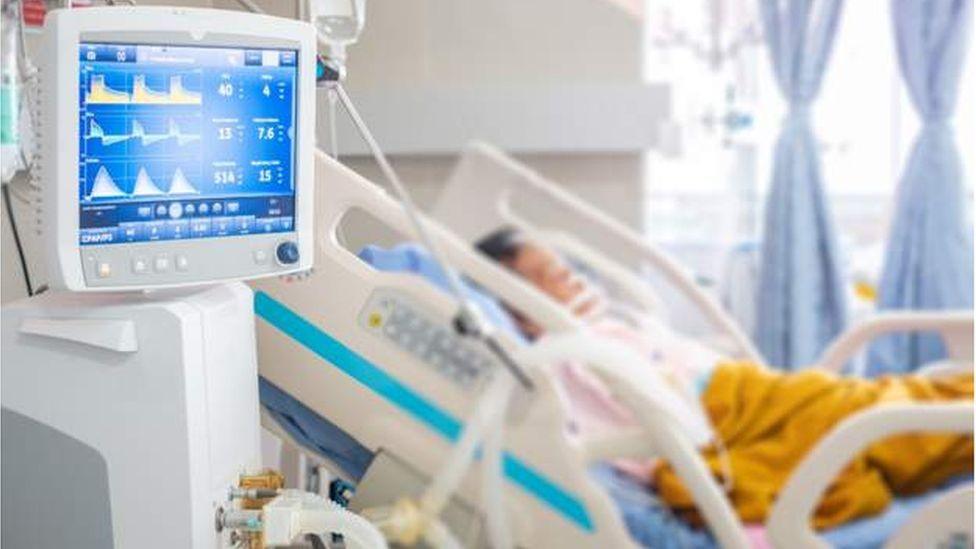Covid: Welsh ambulances face unprecedented pressure, minister says
- Published
- comments
Ambulance crews struggling with 'worst-ever' crisis
The Welsh ambulance service faces pressure like it has never seen before, the country's health minister has said.
Eluned Morgan said she was not "ducking" from responsibility for what her opponents say is a crisis.
It comes as the service asked for help from the military to drive its vehicles.
One frontline worker told BBC Wales crews are spending whole shifts waiting to off-load patients.
Ms Morgan told a Senedd debate calls have increased 20-30% compared to this time last year, that staff were reaching "burnout" and that there was a "blockage" in getting people out of hospitals.
The Conservatives, who forced the debate on Wednesday, said ministers should declare an emergency and called for action.
Figures from July showed only 57.8% of the most serious calls, classed as red, were responded to within eight minutes, below the target of 65%.
The service received more calls in July than in any month since the pandemic began.
Welsh Ambulance Services Trust said it has been under "significant and sustained pressure" in recent months, and it wants assistance to help cope with the winter.
It is the third time it has requested assistance since the Covid pandemic began - the Ministry of Defence is now considering the request.
Trust Chief Executive Jason Killens apologised to "all of those patients that have waited much longer for their emergency ambulance to arrive than we would like in recent weeks and months".
He said the military drivers would "help us put more ambulances on the streets, and get to see more patients more quickly".
But he said that was "not the solution", saying the pressure on his service was a symptom "of a broader problem across urgent and emergency care here in Wales and across the UK".
'Eight hours - that can't be'
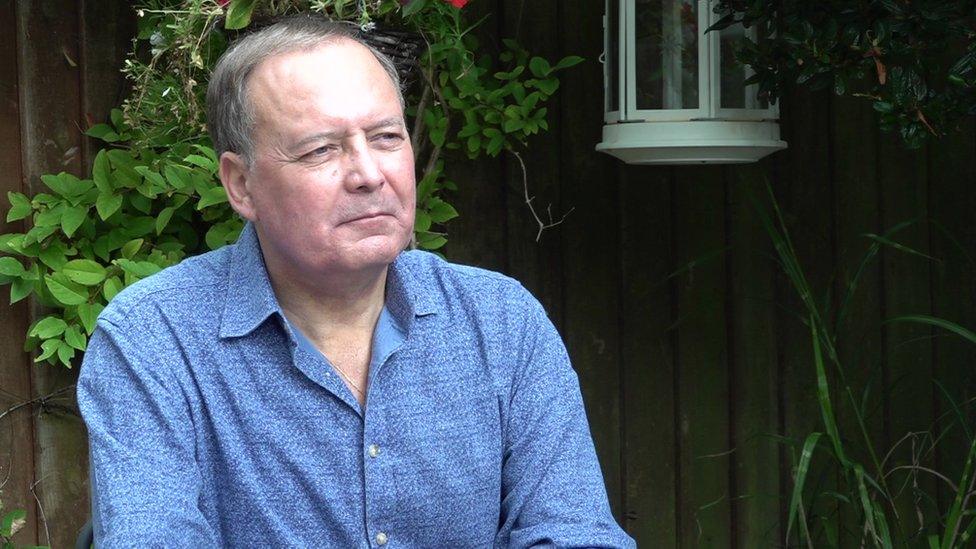
Stewart Manning was told he would have to wait eight hours for an ambulance
Stewart Manning, 59, from Marshfield in Newport, has diabetic gastroparesis, external, a digestive condition which leads him to become very dehydrated.
He said he had experienced a few instances in the past four years where he waited more than three hours for an ambulance.
In June he was told an ambulance would not arrive for eight hours, and his wife Corrine drove him to hospital.
"That was horrific. Eight hours - that can't be," he said.
"It's not the fault of the ambulance crews, it's not the fault of the front line, the coal face, the nurses or anyone else like that.
"But there's got to be someone responsible for the way it is structured. The management, the funding even. There are so many different issues relating to this.
"There are people out there who are not going to be seen to for a long time… they're going to die."
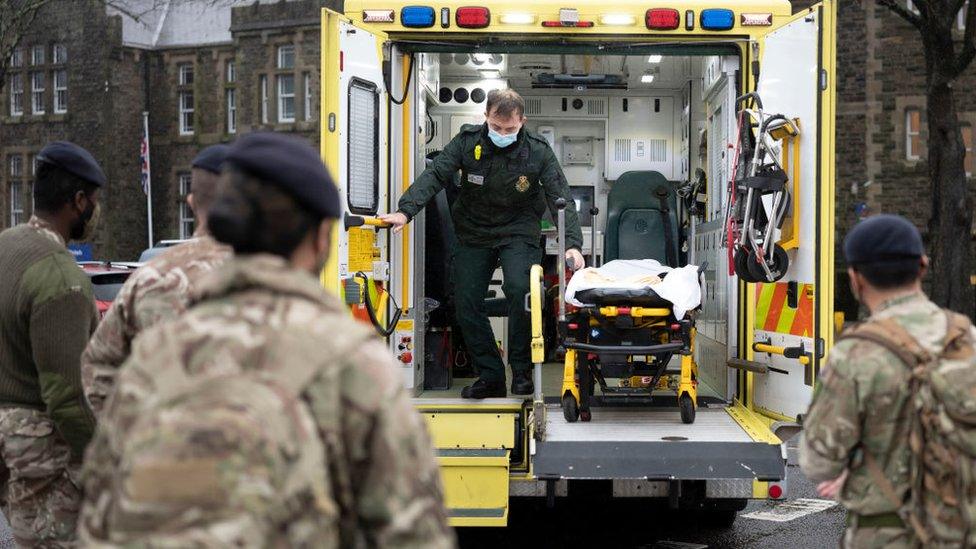
The military has been assisting the ambulance service across the UK
In the Senedd debate on Wednesday Ms Morgan said the service was under "unprecedented pressure".
"I'm not hiding, I'm not ducking, I am absolutely taking responsibility," she said.
"Covid was bad, everybody understood Covid, but everybody in the service at the moment is telling me that this pressure at the moment is worse than anything we've seen."
She said 18% of calls are Covid-related, but handover delays to hospital have a "significant impact" .
The service has been hit by staff absence, caused by sickness which rose by 10% in June, self-isolation, shielding and delayed annual leave.
"We've got to accept the fact that a lot of these people are reaching burnout and they need a break," the minister said.
Ms Morgan added that staff were not taking up overtime as much as in the past, and there were difficulties in "timely discharge in patients from hospital", reducing available hospital beds.
She rejected the call to declare an emergency, but accepted "there is a problem here that needs to be resolved".
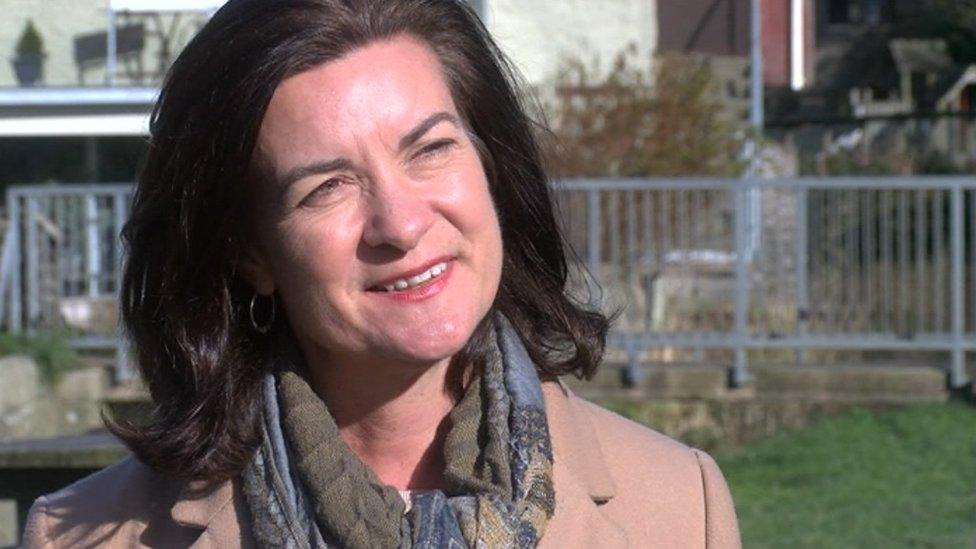
Eluned Morgan said the service faces "unprecedented pressure"
Call for trust to be split up
Senedd members gave examples of problems faced by constituents with the ambulance service.
Welsh Conservative health spokesman Russell George said the service is in "crisis" and has been "for some months".
He said a constituent of his was asked by the service to take a family member with a suspected heart attack to hospital themselves.
Meanwhile Mabon ap Gwynfor, Plaid Cymru MS for Dwyfor Meirionnydd, said he knew of a case where a patient had to wait for 15 hours for an ambulance.
He said it was a "symptom of a deep seated problem", and feared more ambulances on the frontline would "add to the queues of ambulances outside A&E departments".
Labour Swansea East MS Mike Hedges said the Welsh Ambulance Services Trust was "not working effectively" and should be "split up" and run by the individual health boards, "so it's their fault, not somebody else's".
The Trust covers the whole of Wales, while health boards are regional.
He said some were going to hospitals because they could not see a GP.
Mr Hedges appeared to criticise previous health ministers from his own party: "Fortunately for the first time since I was elected, we have a health minister who I am confident will address the problems."
'Never known it as bad'
Paul Amphlett retired as a paramedic six years ago and now works part-time as an emergency medical technician in Brecon, Powys.
"I have never known it as bad as it is at the moment, in the sense that morale is at rock bottom," he told BBC Wales.
"I didn't join the ambulance services to babysit patients outside hospitals for eight, 12 hours."
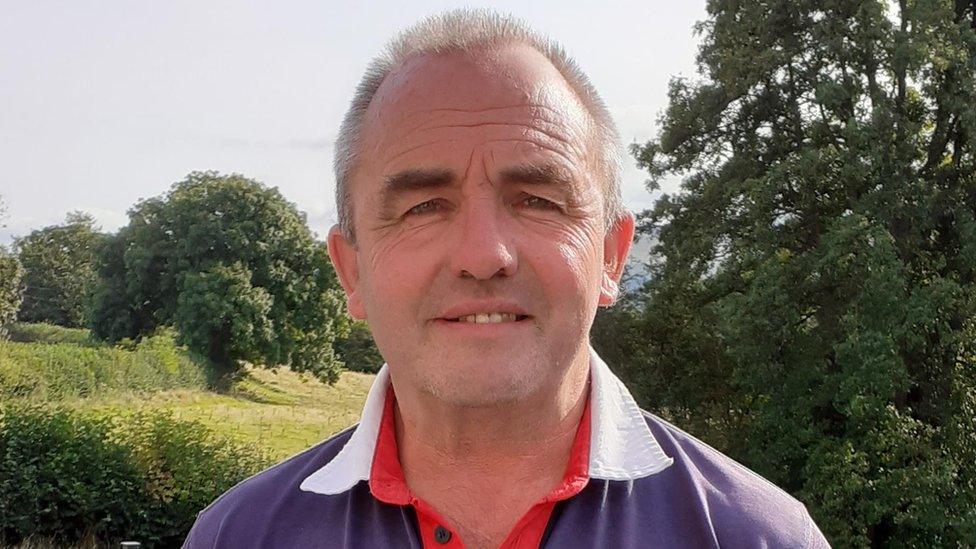
Paul Amphlett said there is "no let-up" in demand for ambulances
Mr Amphlett, 59, said crews from his patch in Powys were being sent across south Wales because the service is so stretched.
"There's no let-up. It's constant.
"They [patients] can't get hold of GPs. They are ringing 111 and are speaking to people telling them to ring for an ambulance because they can't get a doctor."
Welsh Ambulance Services Trust declined to respond to Mr Amphlett's comments.
Third request
The military has assisted the NHS throughout the Covid pandemic. Soldiers helped drive ambulances in Wales on Christmas Eve, at the height of the pandemic's second wave.
The Welsh government said the new request, which it has processed on behalf of the trust, asks for "drivers with a C1 driving licence to deal with increased pressures facing the service over the winter".
Military help for the service was proposed by Welsh Secretary Simon Hart in a letter to the Welsh government sent earlier in September.
The armed forces have assisted other ambulances services in the UK over recent months.
Soldiers will begin driving Scottish ambulances this weekend, while the military was called in to help four trusts in England last month.
A Ministry of Defence spokesman said it has "received a request from Welsh government to support the Welsh Ambulance Service NHS Trust under the military aid to civil authorities process. The request is currently under consideration.
"We are working hard to identify where we can most effectively provide assistance across the whole of the United Kingdom as we continue to tackle the pandemic."

Are you affected by the issues in this story? Please tell us about your experience by emailing haveyoursay@bbc.co.uk, external.
Please include a contact number if you are willing to speak to a BBC journalist. You can also get in touch in the following ways:
WhatsApp: +44 7756 165803
Tweet: @BBC_HaveYourSay, external
Please read our terms & conditions and privacy policy
If you are reading this page and can't see the form you will need to visit the mobile version of the BBC website to submit your question or comment or you can email us at HaveYourSay@bbc.co.uk, external. Please include your name, age and location with any submission.

THE LONG WALK HOME: 20,000 miles, 4 years, 1 man
MOTHERS, MISSILES AND THE AMERICAN PRESIDENT: The story of Greenham told like never before

Related topics
- Published20 September 2021

- Published17 September 2021
